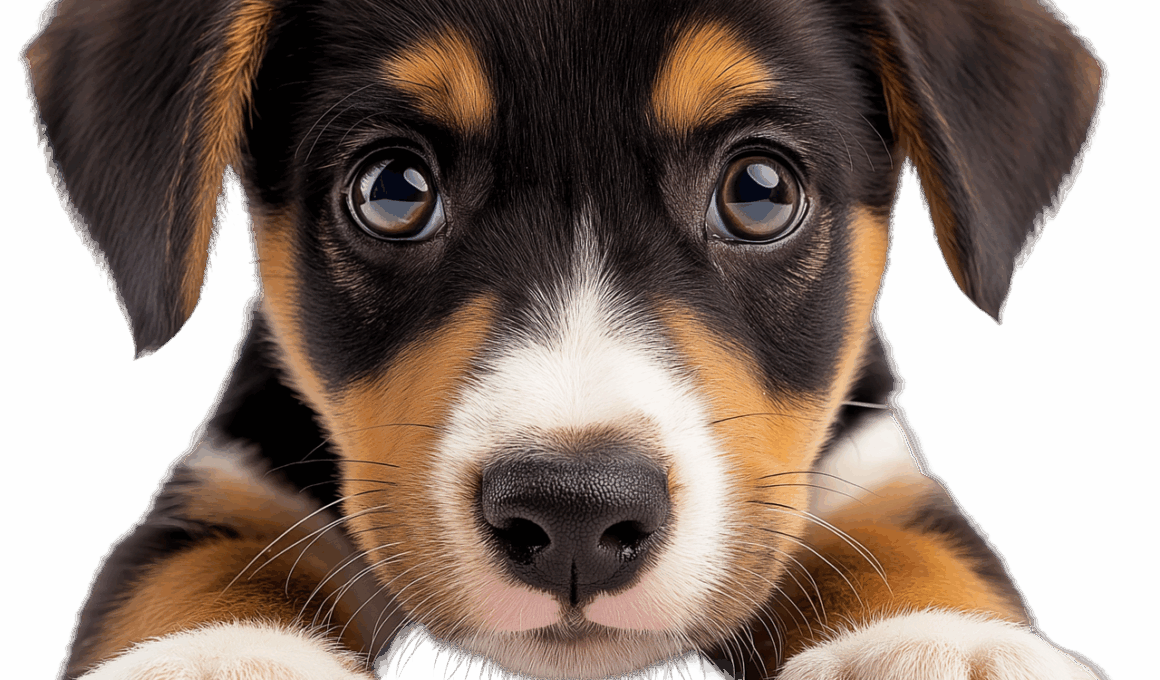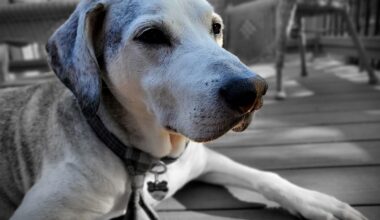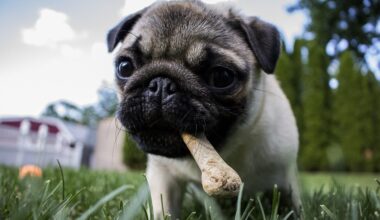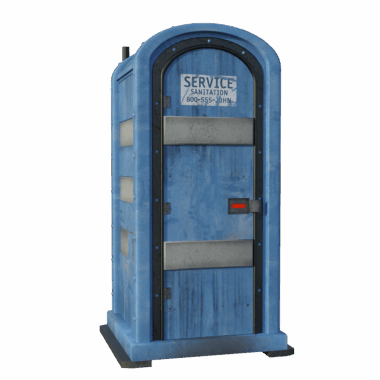How Patience Can Help You Avoid Puppy Potty Training Mistakes
Puppy potty training is a crucial aspect of pet ownership that requires dedication and understanding. Many new puppy owners make common mistakes during this learning process. Patience is a fundamental virtue that can significantly contribute to successful training. Instead of getting upset at accidents, owners should maintain a calm demeanor. When puppies see their owners react negatively, it can create anxiety about bathroom habits. Therefore, practicing patience can foster an environment where puppies feel safe and encouraged. Establishing a consistent routine is essential; take your dog out at regular intervals. Always take them out first thing in the morning, after meals, and before bedtime. Rewarding your puppy with treats and praise when they potty outside reinforces good behavior. Always avoid punishment, as it confuses them rather than educates them. As you train your pup, be aware of their body language, which can indicate the need to go out. A patient approach helps ensure your puppy understands what is expected of them. Over time, with patience and consistency, your puppy will learn and adapt to their new environment.
Another mistake many owners make is not supervising their puppies effectively. It is crucial to keep a watchful eye on them, especially during the early stages of training. Unsupervised puppies might wander off and create messes in areas that are hard to clean. By closely monitoring their activities, owners can anticipate the need to potty and take them outside promptly. Establishing designated potty areas helps too; take your pup to the same outdoor spot each time. This allows them to associate that specific place with the act of elimination. If you notice signs that your puppy needs to go, such as circling or sniffing, act quickly. Reacting at the right moment can make a significant difference. Puppies thrive on routine, so create a daily schedule that includes regular bathroom breaks. During this process, remember that puppies are learning and may make mistakes. Continuing to provide positive reinforcement will make the process smoother. Patience in dealing with setbacks is integral to successful training. Over time, your puppy will gain the necessary skills and understanding of housebreaking principles.
Understanding Your Puppy’s Signals
Puppies communicate their needs through various signals, and learning to recognize these cues is essential for successful potty training. Signs like whining, scratching at doors, or pacing indicate that your puppy needs to go outside. Ignoring these signals can lead to accidents inside, which can frustrate both owner and pet. Consistently responding to these cues with immediate action will promote positive habits. Celebrate the moments your puppy successfully goes outside with verbal praise and treats. This makes the experience rewarding and encourages them to repeat the behavior. Moreover, every puppy is unique; their signals might vary from one dog to another. Spend time observing your pup’s behavior to better understand their specific needs. Puppy’s attention spans can be short, so practicing patience means not becoming impatient when they fail to respond immediately. Instead, continuously redirect them to the appropriate outdoor area until they understand what is expected. Ultimately, clarity in communication between you and your puppy fosters trust. As your puppy learns over time, they will feel more confident, further easing the training process as both grow together.
Consistency is key for puppy potty training success. Puppies thrive in structured environments, and training should adhere to a consistent schedule. Feeding your puppy at regular times helps predict bathroom needs. It establishes a routine that your puppy can learn to follow. Along with feeding, try to maintain consistent potty breaks, using the same phrases when taking your puppy outside. Words like “go potty” can create a verbal association between the command and the action. Whenever a successful potty occurs outside, praise your puppy quickly afterward to enforce the desired behavior. Remember that every puppy is different; some may learn quickly, while others will require more time. Adjusting expectations in accordance with your individual dog’s learning pace fosters a positive environment. Additionally, it’s essential to clean indoor messes thoroughly to eliminate odors that might attract your puppy back to the same spot. Your patience in repeating training sessions and maintaining consistency will encourage gradual success. The more structured the training, the less confusion your puppy will experience. This foundational approach significantly reduces mistakes and frustrations for owners, leading to an easier overall training journey.
Creating a Comfortable Environment
The environment in which your puppy learns significantly affects their potty training success. A comfortable, safe atmosphere allows them to focus on their training without distractions. Make sure your space is clean and free from potential accidents to foster a conducive learning environment. Puppies often learn best in quiet areas, away from intense noise. Consider assigning a specific absorbent area if you’re with your puppy in a confined space. In cases where an accident occurs, a calm response can reassure your puppy that they are not being punished. Create designated spots for play, rest, and potty to reinforce boundaries related to their habits. Using positive reinforcement techniques encourages your puppy to feel relaxed about their learning process. If your puppy is anxious, it could lead to more frequent accidents inside. Patience becomes a valuable tool for navigating these situations while offering guidance and support without negativity. Gradually, a harmonious relationship develops between you and your puppy. With time, the consistency in your approach helps your puppy feel secure and fosters successful potty training experiences as they transition smoothly into becoming well-behaved companions.
In addition to patience and a structured environment, proper equipment aids in successful potty training. Choosing the right supplies, such as training pads, helps prevent mess during the learning phase. Consider using reputable cleaning products that eliminate odors after any accidents occur indoors. This helps prevent your puppy from returning to the same places to relieve themselves again. A crate can be an effective tool for potty training as well. Puppies are less likely to soil their sleeping area, making crates a valuable training aid if used correctly. During travel, crates provide a safe space where they can feel secure. When introducing a crate, ensure it is a comfortable space, not a punishment. Gradually allow your puppy to explore their crate while associating it with positive experiences like treats or toys. This association makes them more willing to use it. Remember to maintain patience and provide gentle guidance during this adjustment period. Taking these steps can significantly reduce potty training mistakes. Every step taken now leads to a more robust, trusting relationship with your puppy that will benefit both of you in the long run.
The Role of Socialization
Socializing your puppy is another critical factor in preventing potty training mistakes. Socialization helps them adapt to new experiences, environments, and people, which aids in reducing anxiety. Introducing your puppy to different social situations early on can help them feel secure and confident. A confident puppy is less likely to exhibit behaviors leading to accidents due to fear or discomfort. Engage in positive interactions with other dogs and people to expand your puppy’s experience. Gradually expose them to various environments, keeping the experience positive and rewarding. Remember to keep the sessions short and finish on a high note. Unfortunately, if your puppy experiences negative situations, it can hinder the training process and create setbacks. Continuous socialization throughout your puppy’s early months helps prevent fear and anxiety in different environments. Patience during this phase is crucial; don’t rush the process, as fostering trust takes time. As puppies learn to adjust to their surroundings, their confidence will increase. This confidence directly impacts their understanding of potty training, making them more successful in learning where and when to relieve themselves. Ultimately, patience and intentional socialization lead to a well-rounded and trained puppy.
Your patience and commitment in navigating the ups and downs of puppy potty training lead to lasting positive outcomes. It is essential to remember that puppies are still learning. They will not perfect their skills overnight. Celebrating small wins throughout the potty training journey helps reinforce good habits. Allow your puppy to learn at their pace while continuing to encourage and guide them through the process. Each puppy is unique and will have its timeline for mastering potty training. Focus on providing support and using positive reinforcement, and don’t hesitate to seek guidance if needed. Online resources, training classes, or consultations with dog behaviorists can offer valuable insight. If you find yourself feeling frustrated or stressed, take a step back and breathe; this process requires time. Developing a bond of trust and understanding between you and your puppy will result in a successful potty training experience. Remember, patience won’t just teach your puppy; it also strengthens your relationship. In the end, your efforts invest in a happy, well-adjusted companion. Enjoy this beautiful journey, allowing your puppy to grow and learn within a loving, nurturing environment.





